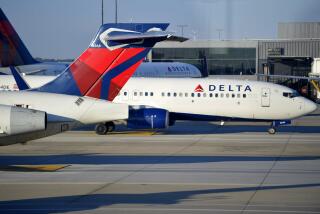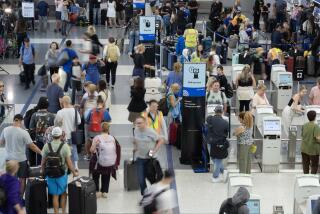Public’s Anger Simmers Over Airport Searches
- Share via
WASHINGTON — The Horrigan family was about to board the flight back to Pittsburgh from Walt Disney World when the gate agent scrutinizing their boarding passes stopped them.
“Caroline is going to have to step aside for a manual scan,” he told Courtney and Frank Horrigan. Caroline is their 3-year-old.
“I honestly thought when he figured out that Caroline was the child, he would ask to search me or my husband,” said Courtney Horrigan. Wrong. So she told her daughter it was time to play a game of “Simon says” with the airline man.
From Orlando, Fla., to Phoenix to Philadelphia, such incidents are prompting travelers to wonder whether aviation security is in danger of running amok and turning on ordinary citizens. Whether the problems stem from overzealousness or bureaucratic ineptitude, making the system more user-friendly has become a concern second only to stopping terrorists.
At the Transportation Department, officials worry that horror stories of passenger harassment will create a political backlash, and they are hiring a high-level ombudsman at the new Transportation Security Administration.
Even experts who believe the government is doing as well as can be expected say officials have failed to spell out passengers’ responsibilities and rights. Another gap is a lack of clear protocols for dealing with minor incidents. Without such guidelines, even a sarcastic comment from a frustrated traveler can escalate into a federal felony charge.
The file of complaints such as the Horrigans’ is growing.
An 86-year-old World War II fighter ace was repeatedly searched at the Phoenix airport last month after screeners discovered a suspicious article in his jacket: his star-shaped Medal of Honor. “The way the [security] guy had it in his hand, it was like you could scratch somebody with it,” said retired Marine Corps Gen. Joe Foss. “I’m not some punk sitting on a hill looking for trouble. They are swatting at gnats and letting the big bees in.” Foss was traveling to West Point to speak to the sophomore class and wanted to show the cadets his medal.
Dozens of women have complained of being groped or subjected to demeaning sexual remarks by male security screeners at airports around the country. Cathleen Reinke of Chicago said she was given a “rubdown” by a male screener at the Philadelphia airport Jan. 16, even though she didn’t set off the metal detector. “It’s like they’re taking advantage of their power, thinking that people are not going to complain. I really didn’t know what my rights were--all I knew is that it was extremely uncomfortable.” Philadelphia police are investigating.
One sign of the system’s problems is that similar infractions have met with radically different responses.
Raho Ortiz was detained by air marshals in November after he broke a rule against leaving his seat during the last 30 minutes of a flight to Washington’s Reagan National. Officials declined to file federal charges.
In Salt Lake City, businessman Richard Bizzaro faces up to 20 years in prison if convicted of interfering with a flight crew during the Winter Olympics. Bizzaro went to the lavatory 25 minutes before his plane landed and claims he did not hear instructions to remain seated. A federal complaint said he “stared intently” at a flight attendant who challenged him. “Mr. Bizzaro is not a criminal,” said Max Wheeler, his lawyer.
“What we are seeing is a lot of wasted energy,” said Barry Steinhardt, associate director of the American Civil Liberties Union. “It’s hard to justify what the purported security benefit is. We certainly should not be giving up our rights for the illusion of security.”
Others say the problems are mostly signs of the stress commercial aviation faces as long as more attacks are a possibility and the new security system remains a work in progress.
“I’m not going to defend groping or some other things that people are doing, but if you assume there is a war going on and the airports are the front line, then maybe we’ve got to accept some of this,” said MIT management professor Arnold Barnett. “Look at the incredible ruthlessness of the people who have brought us to where we are.” Barnett has been a consultant to the Federal Aviation Administration on safety and security issues.
Senior Transportation Department officials said they are keenly aware that efficiency and customer service are keys to their ultimate success.
One official said Transportation Secretary Norman Y. Mineta “went through the roof” when the first complaints of sexual harassment by screeners reached his desk. Arizona Atty. Gen. Janet Napolitano notified Mineta that she is investigating at least 28 complaints of improper searches. Screeners have been told that sexual harassment is a firing offense; they also may be prosecuted.
‘Trusted Traveler’ Program Urged
“We are in the process of making a transition,” said another official, who spoke on the condition that he not be named. “We are not going to have everybody making perfect decisions all the time.”
Department spokesman Lenny Alcivar said the anecdotes from around the country “are not reflective of a widespread problem.” Things should improve dramatically, he said, especially since the government now has direct control of security checkpoints.
But the extent of the problem is unknown. There is no clear channel for consumers to report complaints. The department’s Aviation Consumer Protection Division investigates complaints of poor service and discrimination, but it is unclear whether the obscure office will also handle security problems. Consumers can send e-mail to airconsumer@ost.dot.gov.
Passengers say they support strong security, but at the same time they can’t figure out how the measures applied to them are making travel any safer.
Frank Horrigan said random searches of 3-year-olds like his daughter Caroline divert resources from real security risks. “There was no acknowledgment that this was a silly exercise,” Horrigan said of the Feb. 11 incident in Orlando. “My wife did ask the agent if he realized [Caroline] was 3, and he said he’d done several 3-year-olds that day.”
Courtney Horrigan said she did not feel the incident merited filing a complaint. But a certain chill creeps into her voice when she tells the story.
“I feel it is a symbol of what things are now going to be like in airports, and for our children growing up,” she said. “My daughter is learning at an early age about what life will be like in a new world.”
Experiences such as the Horrigans’ illustrate the importance of creating a “trusted traveler” program, advocates say. Passengers who agree to a background check would receive a special card that would speed their check-in and exempt them from random searches.
“We will wallow in mediocrity if we apply the same security measures to all passengers,” said Kevin Mitchell, chairman of the Business Travel Coalition. “There’s got to be a triage approach.”
Security officials are evaluating the idea, but they worry that terrorists could infiltrate such a program.
The Horrigans followed the rules and experienced only momentary awkwardness. But those who breach security--even if they lack malice--risk having the full weight of the federal government come down on them. Robert Hedrick of Delaware, Ohio, admits to using poor judgment. But he’s facing federal felony charges.
Hedrick is accused of knowingly carrying a concealed weapon on an aircraft--a belt buckle that doubles as a small, single-blade utility knife. The tech support engineer uses the knife as a work tool. Hedrick would have avoided trouble on his Jan. 23 flight if he hadn’t called a radio talk show to report that he was on a plane with a knife. The airport metal detector had failed to pick it up.
“People recognize universally that it was a dumb decision to call a radio station,” said Kort Gatterdam, Hedrick’s lawyer. “He regrets this incident, but he certainly had no criminal intent. I have no doubt in my mind this case would not be there but for Sept. 11.”
Aviation Security Laws Said to Need Refining
Gatterdam said his client called the talk show to ask for advice on what to do, but the government believes he was trying to get attention.
Some experts say it’s time to refine aviation security laws to distinguish between bad judgment--even boorish behavior--and nefarious purposes.
“Maybe you have a guy who ends up having a disagreement with a flight attendant, and all of a sudden you get him for interfering with a flight crew,” said aviation consultant Douglas Laird, a former Secret Service agent and airline security director.
“Some people who are jerks have been overreacted against by people who didn’t have power before and all of a sudden have a lot of power,” he added.
It turns out that Foss, the World War II hero who ran into trouble for carrying his medal at the Phoenix airport, also had a small novelty knife.
It was part of his money clip, a memento from the Congressional Medal of Honor Society. He put the clip--along with a silver bullet key chain given to him by Charlton Heston--in an envelope and paid to have it mailed back to his home.
But he would not part with his medal. Security relented and Foss was allowed to board with it. “Nobody takes that medal,” Foss said. It was presented to him in the Oval Office by President Franklin D. Roosevelt after Foss shot down 26 enemy planes in the Pacific theater--23 in 10 days of combat over Guadalcanal.
The Medal of Honor is on a ribbon. “I suppose you could swing it around like a slingshot,” Foss said. “If some terrorist came at me with something like that, I’d knock him so hard he’d go through the side of the airplane.”
More to Read
Sign up for Essential California
The most important California stories and recommendations in your inbox every morning.
You may occasionally receive promotional content from the Los Angeles Times.













